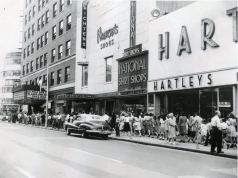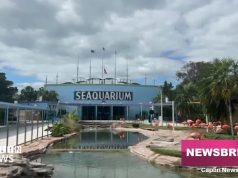With President Trump speaking Monday on the FIU campus about Venezuela, speculation is swirling in Washington about the details of that speech.
The White House has been largely mum on the issue, saying little more than he will speak in support of Venezuelan National Assembly President Juan Guaidó as the country’s legitimate president and, about “the dangers of socialism.”
Trump has said that military intervention is an option to put pressure on Venezuelan leader Nicolás Maduro to step down, while considering other options – but offered no further details. Several legislators nonetheless are clamping down on talk of military intervention while waiting to see what the president says on Monday.
“I do worry about the President’s saber-rattling, his hints that the U.S. military intervention remains an option,” U.S. Rep. Eliot Engel of New York, the Democratic chair of the House Foreign Affairs Committee, said during a hearing Wednesday on Venezuela. “I want to make clear to our witnesses and to everyone else watching: U.S. military intervention is not an option. Congress decides when, where, and how the U.S. military is used around the world, and Congress would not support military intervention in Venezuela.”
According to the U.S. Census, more than half of the 366,000 Venezuelans in the United States call Florida their home, and a majority are in South Florida. The suburban cities of Doral and Weston alone have more than 118,000 residents who identify themselves as Venezuelans or of Venezuelan descent.
With the largest population of Venezuelans in the United States living in Florida, the state’s congressional delegation is naturally weighing in on the situation in the South American country. Republican Senator Marco Rubio recently introduced the Venezuela Temporary Protected Status and Asylum Assistance Act, which would grant protected status to Venezuelans leaving their native country. TPS allows nationals from certain countries fleeing natural disasters, wars, and conflicts to legally remain in the United States for a determined period of time – usually 18 months with the possibility of renewal.
“As Venezuelans continue to face serious threats to their safety and livelihood at the hands of Maduro’s narcoterrorist tyranny, it is clear in-country conditions warrant granting temporary protected status to Venezuelan nationals residing in the U.S.,” Rubio said in a statement. “Granting this protection will provide a temporary solution to many Venezuelans who fear returning to their homeland due to the ongoing crisis and extraordinarily difficult conditions.” The legislation is co-sponsored by several Democratic senators.
On the House side, Democrat Darren Soto of Orlando and Republican Mario Díaz-Balart of Miami introduced similar legislation, the Venezuelan Temporary Protected Status Act of 2019.
“I am grateful to be able to provide a solution to so many who are escaping Maduro’s totalitarian regime,” Diaz-Balart said in a statement. “We must not force Venezuelans who have sought safety in the United States to return to such dangerous conditions.”
Other Florida legislators have expressed support for help for Venezuela, including freshman Democratic Congresswoman Donna Shalala of Miami, who has said that TPS for Venezuelans is one of her top priorities.
Daniel Medina, a Puerto Rican-Dominican resident of the suburbs surrounding Washington, says what is happening in Venezuela is a nothing short of a full-blown crisis.
“The people in power are fighting like children instead of coming to a mutual agreement or discussing what’s going on. It should be the people who get to decide, and the people are leaving because of how expensive everything got for simple things like basic living. I think the main president (Nicolás) Maduro should not be in office, he’s had a whole term before this one and by the looks of it is just making Venezuela worse. It seems like Maduro doesn’t care.”
The situation in Venezuela, however, seems to have garnered little attention outside of the political corridors in Washington, with a lot of the focus of late still on a town slowly recuperating from the longest-ever partial government shutdown that finally ended late last month and the prospects that it could have happened again. Trump’s decision to declare a national emergency to get all of the funds he says are necessary to build a wall along the U.S.-Mexico border sets up a possible clash with Congress and may push the issue of Venezuela down the list of priorities.
Venezuela native Dubraska Vale of Washington tells the SFMN that for the longest time, Venezuela was really not a top topic of conversation in Washington. “What is happening in Venezuela has been a problem for a real long time but no one really talked about it too much until now. I’m actually glad that Trump mentioned Venezuela in the State of the Union and that there is bipartisan support now to help the country because it really wasn’t a priority before.”
Nareemah Griffiths and Ymaris Tejeda are reporters in the Caplin News’s Washington, D.C., Bureau.































